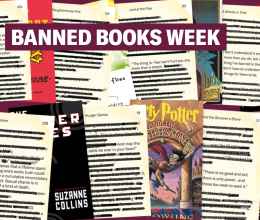Facts
After Donald Trump released his first executive order known as the Muslim Ban, peaceful protests broke out across the nation. On the evening of January 30, 2017, three days after the Ban was announced, organizing groups in Columbus held a rally near the Ohio Statehouse to show resistance to the Ban and solidarity with immigrants. After a rally and a short march, most protesters left, but a smaller group of them returned to an intersection near the Statehouse. Columbus police formed a line in the street, facing the protesters. The remaining protesters faced the police and chanted and prayed. Meanwhile the police issued repeated dispersal orders. After about 40 minutes, the police sprayed pepper spray in the air just above the crowd. The protesters turned around and immediately began to disperse. As they were retreating from the area, the police chased several targeted individuals and sprayed them again, directly in the eyes and face, at very close range. The audio provided by police body cameras revealed that some police officers intentionally targeted these specific individuals in advance.
Legal Theory
Columbus police officers violated the Fourth Amendment prohibition on excessive use of force and the First Amendment rights to speech and assembly when they targeted and pepper sprayed peaceful, unarmed protesters who were in the process of complying with dispersal orders.
Status Update
On July 12, 2017, we filed suit in the Federal District Court for the Southern District of Ohio on behalf of three of the demonstrators who were sprayed at close range. The Defendants were three unnamed Columbus police officers (identified as “John Doe” defendants), Jeffery Lipp, the commanding lieutenant from the event, Kim Jacobs, the Chief of Police, and the City of Columbus. On October 2, 2017 Defendants filed their Answer. Parties held the 26(f) conference on October 16 and the 26(f) report was filed on November 29. We conducted discovery in January and February to identify the John Doe police officer defendants. The Defendants provided incomplete responses to our initial discovery requests. The Court ordered Defendants to supplement their responses by February 20. The Court also granted our request for an extension of time to amend our complaint. Defendants then served supplemental discovery responses that allowed us to identify two of the three John Doe defendants, and we filed our First Amended Complaint on March 1, 2018. Defendants filed their Answer on March 22. However, when Defendants answered the First Amended Complaint, they informed us that the supplemental discovery responses they had provided had been incorrect, and that based on that misinformation, the named Defendants in our Amended Complaint were likely incorrect. On April 5, 2018, the Court entered an Order to Show Cause as to why it should not dismiss the remaining John Doe Defendant without prejudice. On April 10 we filed a Response informing the Court of Defendants’ incorrect discovery responses and a Motion for Leave to Amend the Complaint and to Modify the Discovery Schedule. On April 11 Defendants filed a Response. The Court granted our Motion, extending the time to identify the final John Doe until June 5, granting leave to file a Second Amended Complaint, and extending the discovery schedule. On April 20 we filed a Second Amended Complaint that corrected the identities of two of the John Doe officers, and a Stipulated Notice of Dismissal of a an individual officer defendant whom we had incorrectly named. Defendants filed their Answer on May 10, 2018. In the meantime, we propounded a second set of discovery requests to determine the identity of the remaining John Doe officer before the June 5 deadline to amend our complaint to join him. On June 4, Defendants submitted incomplete discovery responses again. On June 8 the Court ordered us to show cause by June 22 as to why the John Doe Defendant should not be dismissed. The Court directed Defendants to supplement their discovery responses by July 11 and granted us an extension of time to file a Third Amended Complaint. Finally, Defendants’ supplemental discovery responses identified the third unnamed officer Defendant. On August 3 we filed the Third Amended Complaint, naming the final Defendant, and on August 17 Defendants filed their Answer. In late August, 2018, we deposed each of the three officer-defendants and defended two of our clients’ depositions. On September 20 we filed an unopposed motion to extend the discovery cutoff until May 1, 2019 and the dispositive motions deadline until June 15, 2019. On September 21 the Court granted our motion and set a new trial date for February 18, 2020. Defendants moved to dismiss this plaintiff from the case. After providing multiple requisite notices to our client reminding him of his obligation to participate in the litigation process and informing him of his possible court-ordered dismissal from the case, we withdrew as his counsel. We proceeded on behalf of our other two plaintiffs. We propounded additional discovery on our Monell claims before discovery closed on June 1, 2019. On July 12, Defendants filed a Motion for Summary Judgment. We filed a cross Motion for Partial Summary Judgment, seeking judgment on the Fourth Amendment individual capacity claims only, on July 15. The Parties exchanged opposition and reply memoranda, and briefing concluded on August 20, 2019. The operative calendar order has trial set to commence on February 18, 2020. On December 3, 2019 the Court ruled on the parties’ Motions for Summary Judgment. The Order granted Defendants’ Motion in part, dismissing Plaintiff Harrison Kallner’s claims and both Plaintiffs’ First Amendment and Monell claims. The Court further ruled that an issue remained for trial regarding whether Ellen Abdur-Rahim could prove her Fourth Amendment excessive force claim and state law claim of assault and battery, and denied Defendants’ Motion to dismiss these claims on qualified immunity grounds. On December 18, Defendants filed a notice of appeal challenging the Court’s decision as to the denial of state statutory immunity and qualified immunity. On January 6, 2020, we filed our appearance in the Sixth Circuit Court of Appeals. Defendant-Appellant filed his appellate brief on February 18, and we filed ours on March 18. Briefing concluded on April 8 and Elizabeth Bonham argued the case before the Sixth Circuit on July 28. On August 26, 2020, the Sixth Circuit ruled that Defendant Justin Masters was entitled to qualified immunity on our 4th Amendment excessive force claim, reversing the District Court and ending that claim. The Court also held that our parallel state claim—for assault and battery—should continue, because a jury could find that Masters acted with malice toward our client, meaning that state statutory immunity would not shield him from liability.
After the mandate issued, the District Court held a status conference on October 1, and determined that it would retain its supplemental jurisdiction over the state law claim and that the parties would proceed to trial in federal court. On October 5 the Court set trial for December 7, 2020, to be held in person. Due to the growing intensity of the pandemic, on November 19 the Court granted a joint motion to vacate the trial date. The Court has been holding, and will continue to hold, monthly status conferences to confer on a safe trial date, potentially in the spring. The parties will have 30 days in advance of the trial to finish pre-trial preparations. At the February 10, 2021, status conference, the Court established a pre-trial briefing schedule.
The parties filed their witness and exhibit lists and Plaintiff filed her pretrial disclosures on March 17. Defendants filed a Motion in Limine on March 24 and proposed voir dire instructions on March 25. On April 5, we filed a Joint Notice of Settlement. The City of Columbus agreed to pay Ms. Abdur-Rahim $10,000. After she received her payment we will filed a notice of dismissal.







